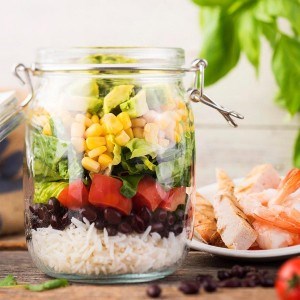
With so many cookbooks, blogs and a sea of Pinterest boards, finding a healthy meal plan that works for you and your budget can be overwhelming. Local nutritionist Kirsten Oilund helped a small group wade through some of those options during an evening class at the Jasper Adult Learning Centre, Jan. 31.
The 51���� was in attendance and is hoping to pass on some of Oilund’s food savvy knowledge to our readers.
Planning
Like almost everything in life, healthy eating on a budget takes some planning, but sometimes just figuring out where to start can be half the battle. Oilund suggested sitting down about once a week to map out a meal plan that’s going to work with your schedule.
“I try to start planning on the day that I’m going to buy groceries, and if you’re someone who only goes to the grocery store once a week then a weekly plan should work, but if you’re someone who goes to the store every two or three days then try making a meal plan just for those days,” Oilund said. “Make a plan that’s going to work for you—if you know you have a long day on Thursday and won’t be home then be prepared and plan for that.”
For those hectic days, Oilund recommended cold platters like veggies, crackers and hummus or set aside some leftovers from the day before.
“Realistically nobody cooks every day, so plan for the days you know you’re not going to be cooking.”
Starting your meal plan
If you’ve decided that a weekly plan works for you then grab a blank seven-day calendar with enough spaces for seven breakfasts, lunches, dinners and snacks.
“That 4 p.m. snack you’re going to plan is going to be your lifesaver. You won’t end up spending money on a quick snack that’s probably filled with sugar and salt and it will prevent you from ripping the door off your fridge the second you get home,” Oilund said.
“For a snack I suggest planning a protein and a complex carb like a fruit.”
For the rest of your daily meals, Oilund said try not to stress it by picking meals that you already know and like.
“I’d only try a new recipe once or twice a week. For your meal plan go with the tried and true,” she said. “It’s easier, quicker and you know you already like it.”
Cupboard inventory
Now that you’ve mapped out your meals for the week it’s time to go shopping—or is it? Before heading to the store, Oilund said make a list of everything you already have laying around your shelves or crammed at the back of the freezer—not only does this prevent food waste, but it also saves you some cash.
“Write it down. If you don’t know what you have then it’s going to go bad,” said Oilund, adding that you should always check the best before dates during your weekly fridge raid. “If you’ve got a little bit of certain vegetable left or the last bit of some sauce then throw it in a stir fry or frittata.
“I don’t like to waste anything.”
Shopping
So now you know what you need, but you’re still looking to keep your wallet happy. For that, Oilund said don’t be afraid to be flexible. Try switching out the fruits and veggies on your list for the ones that are on sale or try swapping pricey meats with protein-filled pulses (beans, split peas, eggs, nuts and tofu).
“Pulses are not only better for the environment, they are also healthier and cheaper,” Oilund said.
Also, don’t be afraid of canned and frozen goods, according to Oilund, they’re just as nutritious as their fresh counterparts.
“Canned tuna and non-battered frozen fish is great and usually cheaper. If you’re buying canned fruit just make sure it’s stored in water and not syrups or fruit juices—the same goes for vegetables and sodium,” she said.
Another tip for casual bakers and sometimes coffee drinkers, if you find you’re constantly picking up milk and cream just to have the majority of it go bad then try picking up skim milk powder and cans of evaporated milk for your coffee.
“Skim milk powder is great for people who don’t drink a lot of milk. You can freeze it and it doesn’t go bad,” Oilund said. “As for evaporated milk it’s cheaper, more nutritious and thicker with less fat.”
Other budget smart tips include checking the weekly flyers for deals and coupons, check best before dates before you buy, and ask bakeries and stores if they have any day-old products available for a portion of the cost.
Another tip is set a weekly grocery allowance and only take that exact amount of cash with you to the store.
“That way you’re forced to only get what you need and you’ll prioritize,” Oilund said.
Storage
Now that you’ve made it out of the store on a budget and with healthy options, it’s time to put all your purchases away.
After shopping, Oilund said to place newer items at the back of the shelf and move older items to the front, so they can be used first.
Store vegetables and fruits, whole and unwashed, until ready to use. This will help them last longer. Put meat, poultry and fish in the fridge as soon as you get home from the store. Put them on a dish at the bottom of the shelf so juices don’t drip onto other foods.
Any extra meats or fish that won’t be used within one or two days should be frozen to use later.
When storing leftovers in the fridge or freezer, place them in see-through containers or label them. Oilund also suggested dating the containers so you can use them before they spoil.
Kayla Byrne
[email protected]
